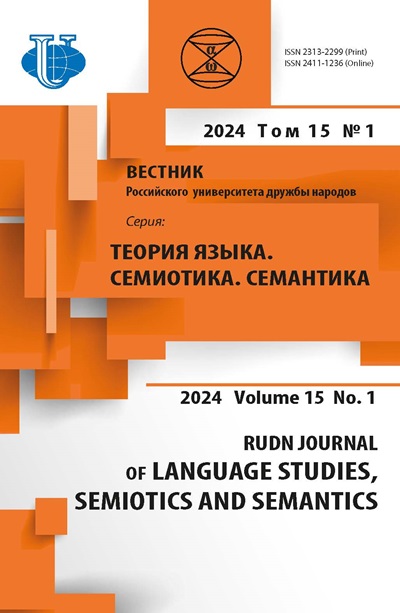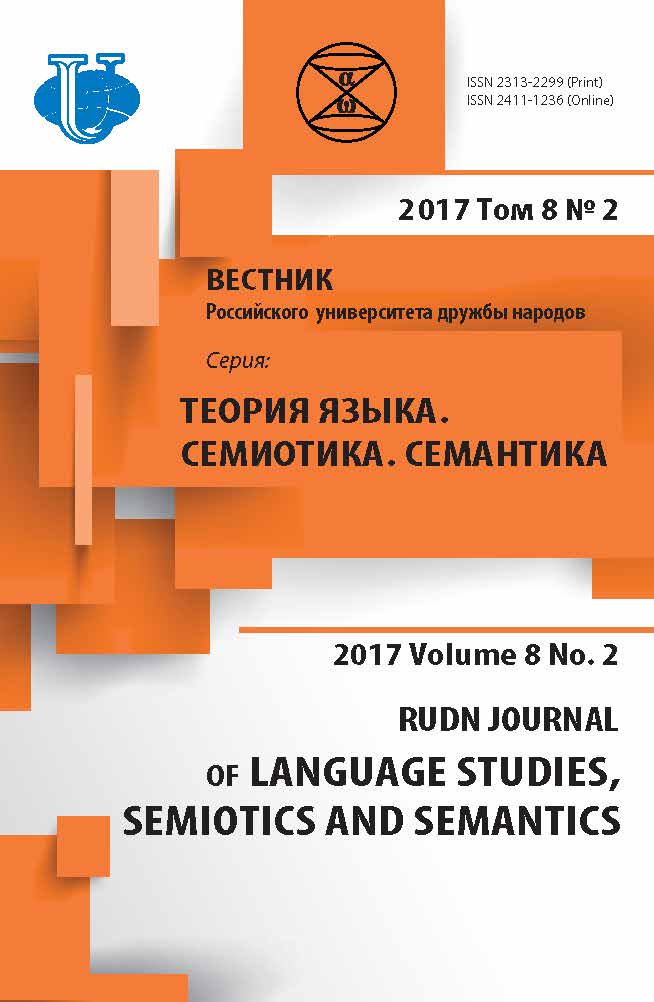Terminological Aspect of Political Discourse in the German Media
- Authors: Chigasheva M.A.1
-
Affiliations:
- Moscow State Institute of International Relations (MGIMO-University)
- Issue: Vol 8, No 2 (2017)
- Pages: 358-366
- Section: Articles
- URL: https://journals.rudn.ru/semiotics-semantics/article/view/16345
- DOI: https://doi.org/10.22363/2313-2299-2017-8-2-358-366
Cite item
Full Text
Abstract
Political discourse is a complex communicative phenomenon and its study may be multilateral. This paper highlights some of the linguistic features of political discourse in the Germany media and offers a classification of the most common language means. An important role is attributed to deonimization, possibilitz of appellativation of nominal stems, in particular, the names of German politicians. Moreover new lexical units are filled with a certain meaning, and receive a strong negative connotation under the influence of extralinguistic factors. Of particular interest is the consideration of the possibility terminalization of deonim. Analysis of the concept of “term” and the ways of its formation and basic characteristics of deonimic units suggests possible transition from the category of deonims nonce words and slangwords into the category of terms that is demonstrated in some instances.
About the authors
Marina Anatolyevna Chigasheva
Moscow State Institute of International Relations (MGIMO-University)
Author for correspondence.
Email: mchigasheva@mail.ru
Prospect Vernagskogo, 76, Moscow, Russia, 119454
References
- Nikitina, K.V. (2006). The Political Discourse of the Media and its Features, which Create Conditions for the Manipulation of Public Opinion. Management of public and economic systems, 2, 1—7. (in Russ).
- Nikitina, O.A. (2015). Peculiarities of New German Verbs Formation Based on Anthroponyms. Scientific dialogue, 11(47), 42—54. (in Russ).
- Reformatskyi, A.A. (2011). Introduction to Linguistics. Moscow: Aspect Press. (in Russ).
- Rozental', D.Je., Telenkova, M.A. (2001). Dictionary of Linguistic Terms. Moscow: LLC “Publishing Astrel”, LLC “Publishing house AST”. (in Russ).
- Russian Language. Encyclopedia (1997). Ch. Ed. Yu.N. Karaulov. Moscow: The Big Russian Encyclopedia; Drofa. (in Russ).
- Superanskaya, A.V., Podol'skaya, N.V. & Vasil'eva, N.V. (2003). Common Terminology: Theory. Ed. T.L. Kandelaki. Moscow: Editorial URSS. (in Russ).
- Chigasheva, M.A. (2015). Borrowings from English in the German Media Political Discourse. Philology at MGIMO, 3, 34—47. (in Russ).
- Sheveleva, I.A. (2010). Linguistic Features of Online Media-Discourse. In: Language, mind, communication. Ed. V.V. Red, A.I. Izotov. Moscow: MAX Press. Issue 41. p. 50—54. (in Russ).
- Jakovleva, A.A. (2014). On the Concept «Term» in Modern Linguistics. Interexpo Geo-Siberia, 2, 88—94.
- Duden — Das große Wörterbuch der deutschen Sprache. URL: http://www.duden.de/ rechtschreibung/Marxismus (accessed: 15.01.17).
- Duden — Das große Wörterbuch der deutschen Sprache. URL: http://www.duden.de/ rechtschreibung/roentgen (accessed: 15.01.17).
- Gerhard, Wahrig. (1988). Deutsches Wörterbuch. Mosaik Verlag GmbH, München.
- Wengeler, M. (2010). Schaubleweise, Schröderisierung und riestern. Formen und Funktionen von Ableitungen aus Personenamen im öffentlichen Sprachgebrauch. Komparatistik Online. Dusseldorf, Trier. p. 79—98.













